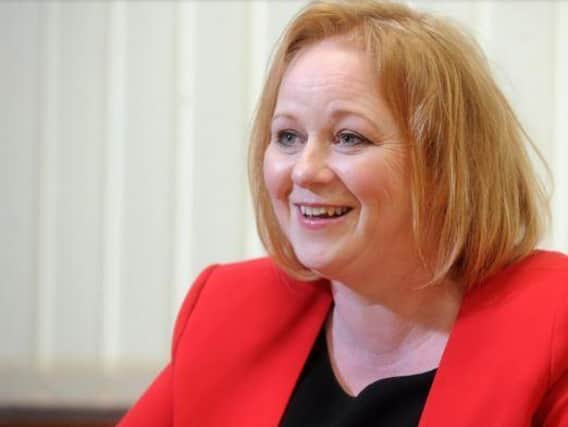Bradford South MP Judith Cummins backs constituent's call for family members of care home residents to be key workers


Bradford South's Judith Cummins yesterday told a House of Commons debate on Covid-19 and dementia about Tracy Gothard in the hope the move would allow informal carers to visit loved ones in person.
The constituent had released a video of what happened when she visited her mother, Doreen, who has dementia, in a nursing home in Bradford.
Advertisement
Hide AdAdvertisement
Hide AdIn the clip, Tracy and her sisters stand outside and speak to their mother in the car park through a closed window.
Doreen asks Tracy to come inside and motions with her hand, to which her daughter replies: 'I can’t come in. We are not allowed yet because of that nasty bug.'"
Mrs Cummins told the debate: "Doreen’s face crumples, and she breaks into tears. It is a heartbreaking video, and I do not think that anybody can watch it and not be moved to tears."
She added: "The window meeting between Tracy and her mum was the first one that they had since August, when Bradford was placed under local restrictions.
Advertisement
Hide AdAdvertisement
Hide Ad"I asked Tracy what she would like me to say to the Minister on her behalf in this debate. She said: 'I’m begging from the bottom of my heart to give key worker status to just one family member, to help us see loved ones in care homes.
"This has now been ongoing for too long, and in my 51 years of life, I have never not seen my mum, especially at Christmas. I appeal to your better nature, on behalf of myself and thousands more, to not let this continue.'
"Tracy speaks on behalf of everyone who has a loved one with dementia in a care home.
"Anyone who has cared for someone living with dementia knows that regular contact with family members keeps that spark inside alight. Digital visits are simply not appropriate, as people with dementia view the world differently. Memory clinics must reopen, and they need to be in person.
Advertisement
Hide AdAdvertisement
Hide Ad"As virtual memory clinics, they cannot simply replicate the quality and appropriateness of a face-to-face appointment for anybody living with dementia.
"The Government need to recognise that family carers play an essential part in caring for people with dementia who live in care homes. When family carers are unable to visit and provide that care, the health and wellbeing of people with dementia can seriously decline at a rapid pace."
Mrs Cummins said she fully supported the call by the Alzheimer’s Society and others to designate at least one informal carer - an unpaid carer which is often a family member - per care home resident as a key worker, with access to testing, training, PPE and eventually vaccinations.
She also asked the Minister for Care, Helen Whately MP, to clarify whether an adult caring for another adult with dementia can form a support bubble with another household as "the regulations are not explicit on that, and our carers need that support".
Advertisement
Hide AdAdvertisement
Hide AdFinally, she quoted a Equality and Human Rights Commission report, which says there is "evidence that human rights standards may have not been upheld in the response to the pandemic" including key decisions about "care home admissions, visits, access to critical care and prioritisation of testing, putting people with dementia and other care home residents at greater risk of harm".
Mrs Cummins said: "That should be a wake-up call to us all: inaction is not an option."
The minister replied: "I want people to be able safely to visit their loved ones in care homes, but this is hard.
"Covid has taken the lives of 15,400 people living in care homes, and we know that when covid gets into a care home, particularly one that is looking after people with dementia, it is hard to control.
Advertisement
Hide AdAdvertisement
Hide Ad"Anyone can bring it in, particularly since many people have covid without any symptoms, so they do not know they have it. That is why we have advised care homes to restrict visiting, particularly during this national lockdown when covid rates are high in much of the country; in some areas, as many as one in four people have covid.
"I did not want care homes to be closed up again during this lockdown, as they were in the first time around. We are advising care homes to do things that many have already put in place, such as allowing visits through screens and windows, but I know that that is not the answer, particularly for those with advanced dementia.
"That is why we are launching our trial of visitor testing on 16 November in 30 care homes.
"We are trialling both PCR and lateral flow tests to find the best way of doing this, with the intention of rolling out testing for visitors across the country as fast we can in December. I want people to be able to touch, hold hands and hug again. I cannot say when that will be possible, but, believe me, I want to make it possible again."
Advertisement
Hide AdAdvertisement
Hide AdOn the issue of support bubbles, Ms Whately said: "As (Ms Cummins) probably knows, an adult can form a support bubble with another household as long as that household is a single person. The restrictions allow somebody entry into the house of a person who requires care to give care, and to give the carer respite.
"I will take away the question of a larger bubble—I have been asked about it by other colleagues, and she and I have spoken about it—and whether I can do anything further to help on that."
Comment Guidelines
National World encourages reader discussion on our stories. User feedback, insights and back-and-forth exchanges add a rich layer of context to reporting. Please review our Community Guidelines before commenting.